人教版(2019)必修第一册Unit 1 Teenage Life Discovering Useful Structures 课件(共35张PPT,内嵌视频)
文档属性
| 名称 | 人教版(2019)必修第一册Unit 1 Teenage Life Discovering Useful Structures 课件(共35张PPT,内嵌视频) | 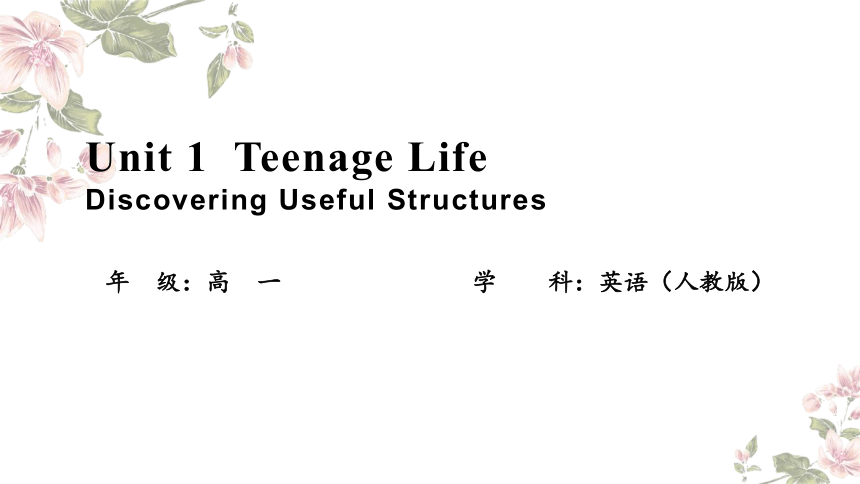 | |
| 格式 | pptx | ||
| 文件大小 | 17.7MB | ||
| 资源类型 | 教案 | ||
| 版本资源 | 人教版(2019) | ||
| 科目 | 英语 | ||
| 更新时间 | 2024-07-14 11:30:22 | ||
图片预览

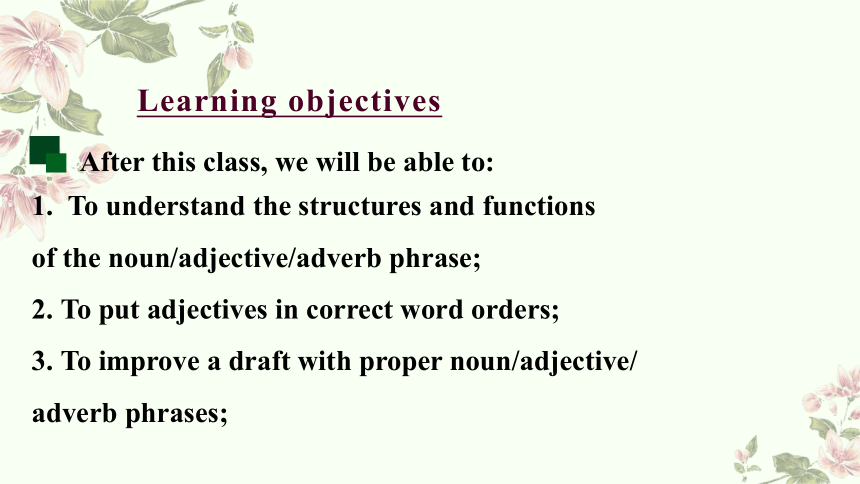
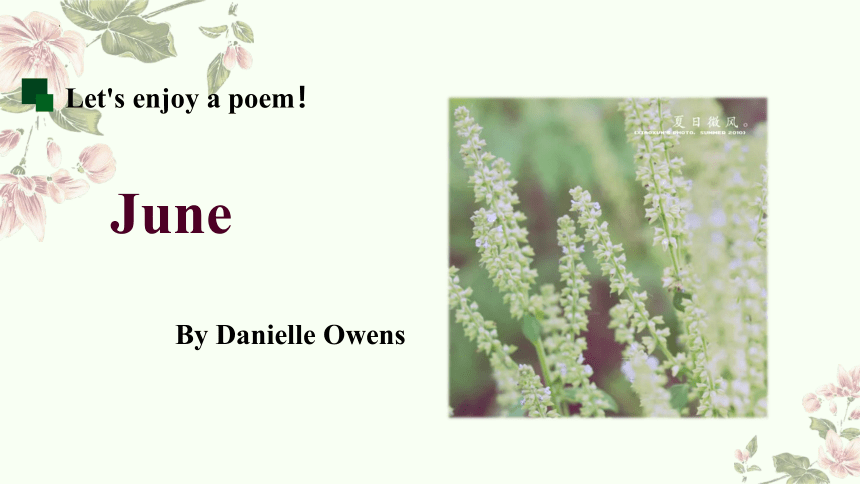
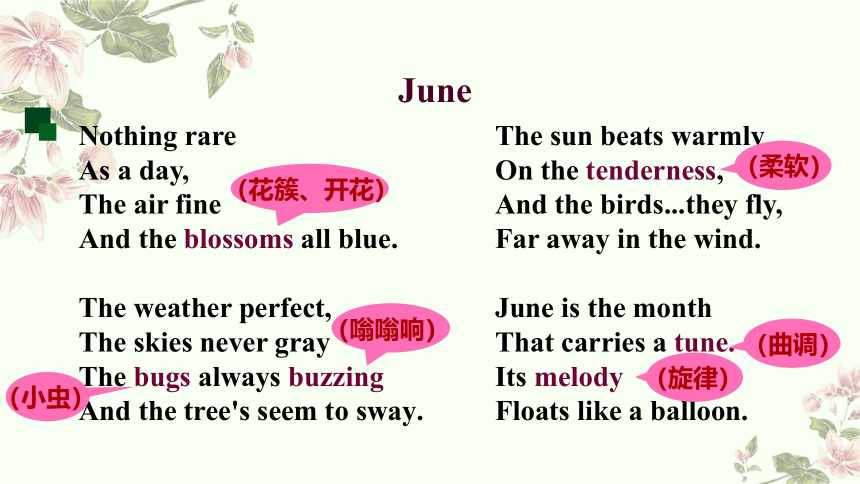
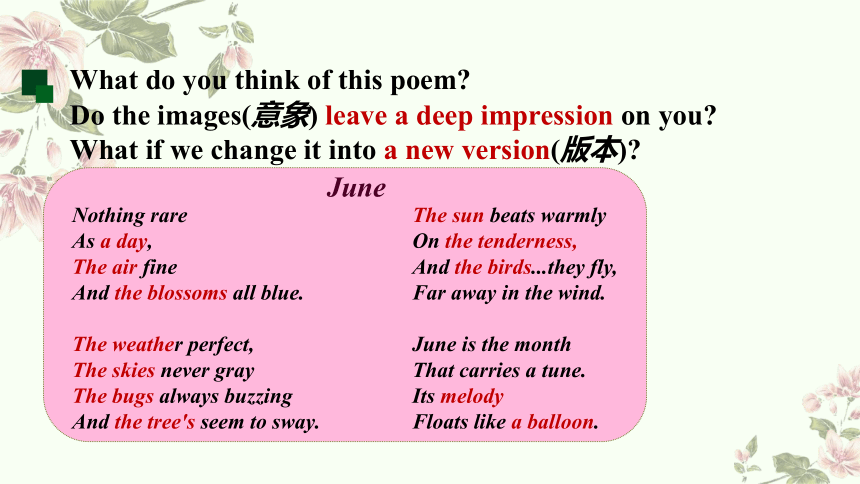
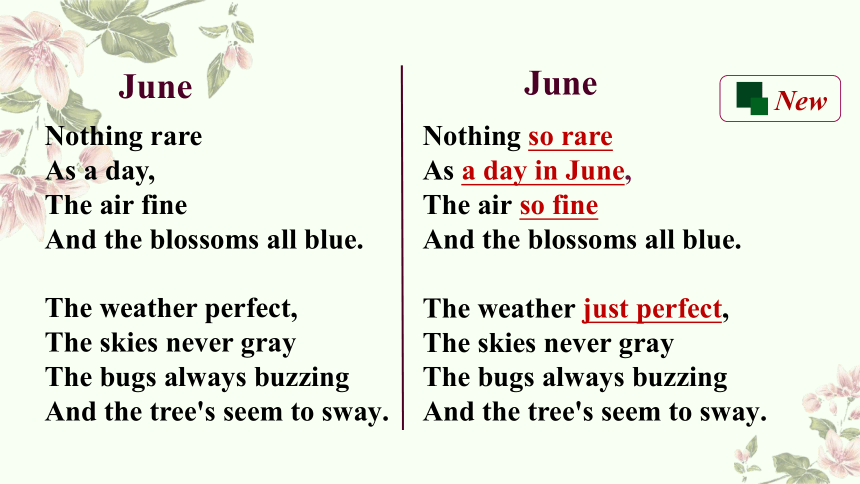
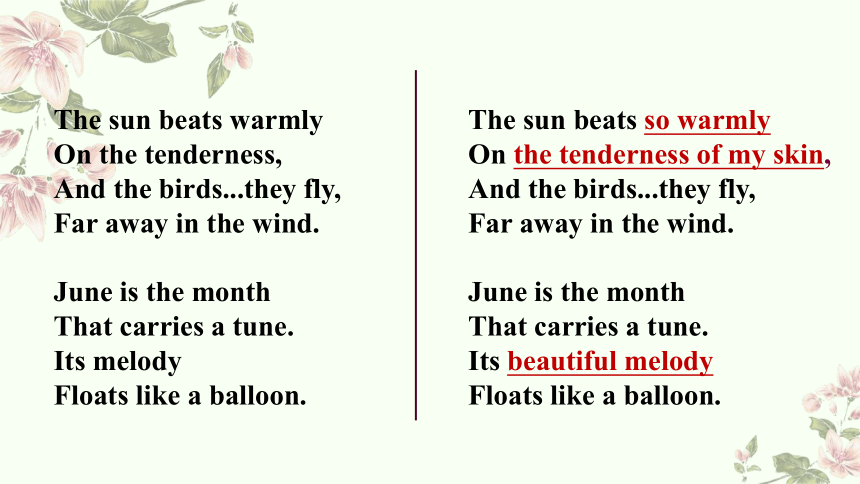
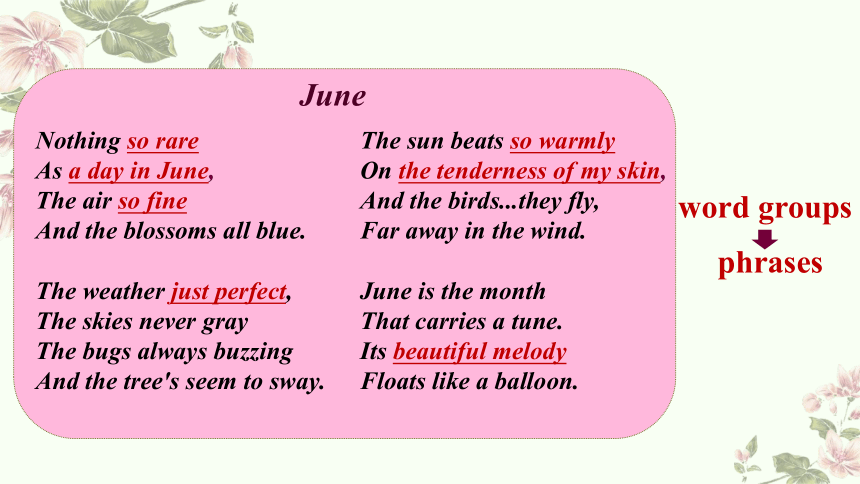
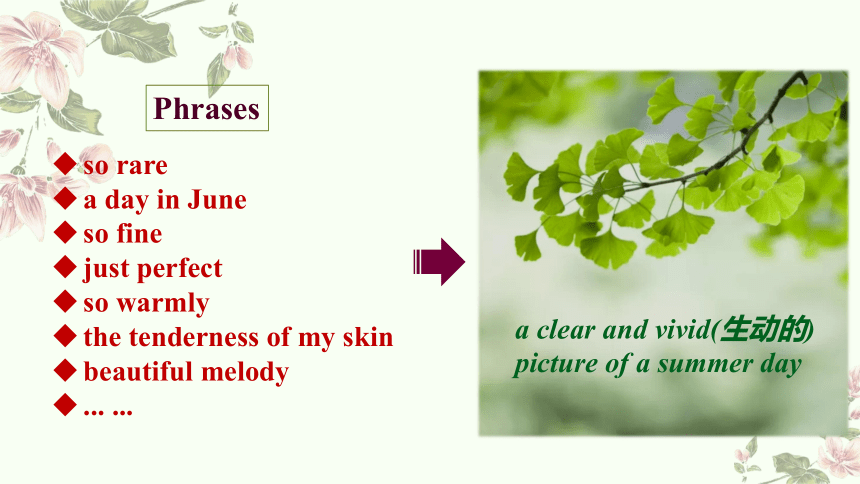
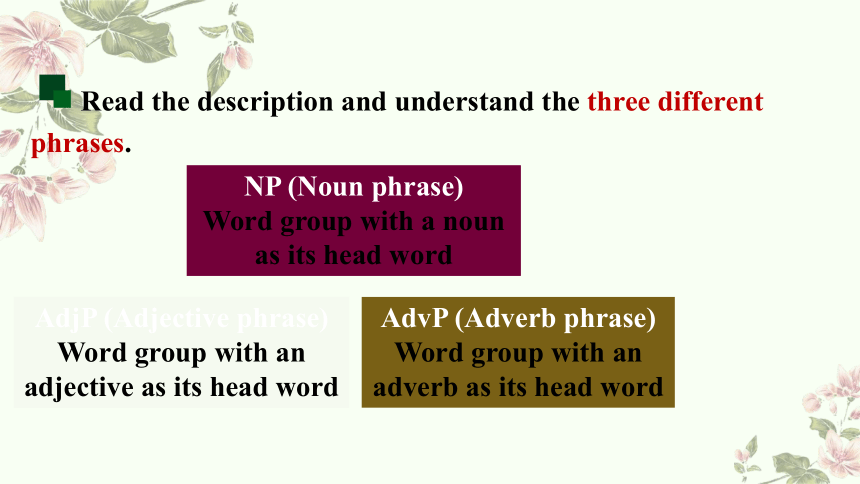
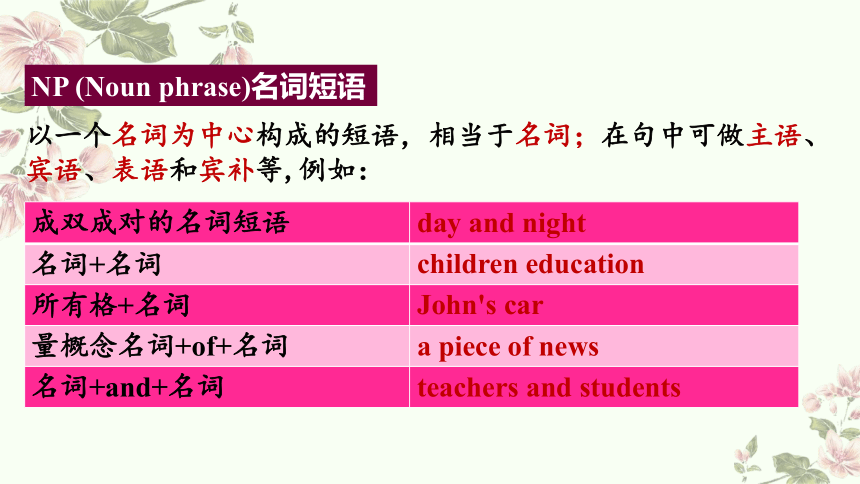
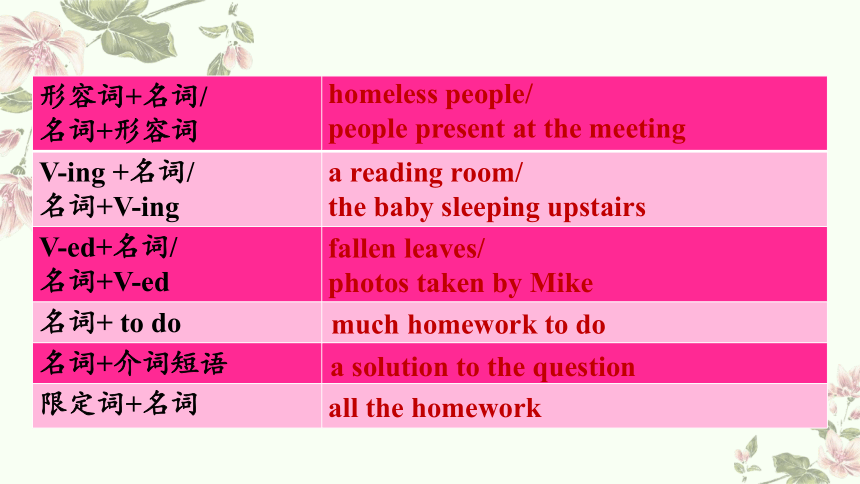
文档简介
(共35张PPT)
Unit 1 Teenage Life
Discovering Useful Structures
年 级:高 一 学 科:英语(人教版)
Learning objectives
1. To understand the structures and functions
of the noun/adjective/adverb phrase;
2. To put adjectives in correct word orders;
3. To improve a draft with proper noun/adjective/
adverb phrases;
After this class, we will be able to:
Let's enjoy a poem!
June
By Danielle Owens
Nothing rare
As a day,
The air fine
And the blossoms all blue.
The weather perfect,
The skies never gray
The bugs always buzzing
And the tree's seem to sway.
The sun beats warmly
On the tenderness,
And the birds...they fly,
Far away in the wind.
June is the month
That carries a tune.
Its melody
Floats like a balloon.
(花簇、开花)
(嗡嗡响)
(柔软)
(曲调)
(旋律)
June
(小虫)
Nothing rare
As a day,
The air fine
And the blossoms all blue.
The weather perfect,
The skies never gray
The bugs always buzzing
And the tree's seem to sway.
June
The sun beats warmly
On the tenderness,
And the birds...they fly,
Far away in the wind.
June is the month
That carries a tune.
Its melody
Floats like a balloon.
What do you think of this poem
Do the images(意象) leave a deep impression on you
What if we change it into a new version(版本)
Nothing so rare
As a day in June,
The air so fine
And the blossoms all blue.
The weather just perfect,
The skies never gray
The bugs always buzzing
And the tree's seem to sway.
Nothing rare
As a day,
The air fine
And the blossoms all blue.
The weather perfect,
The skies never gray
The bugs always buzzing
And the tree's seem to sway.
New
June
June
The sun beats so warmly
On the tenderness of my skin,
And the birds...they fly,
Far away in the wind.
June is the month
That carries a tune.
Its beautiful melody
Floats like a balloon.
The sun beats warmly
On the tenderness,
And the birds...they fly,
Far away in the wind.
June is the month
That carries a tune.
Its melody
Floats like a balloon.
The sun beats so warmly
On the tenderness of my skin,
And the birds...they fly,
Far away in the wind.
June is the month
That carries a tune.
Its beautiful melody
Floats like a balloon.
Nothing so rare
As a day in June,
The air so fine
And the blossoms all blue.
The weather just perfect,
The skies never gray
The bugs always buzzing
And the tree's seem to sway.
June
word groups
phrases
so rare
a day in June
so fine
just perfect
so warmly
the tenderness of my skin
beautiful melody
... ...
Phrases
a clear and vivid(生动的) picture of a summer day
AdvP (Adverb phrase)
Word group with an adverb as its head word
AdjP (Adjective phrase)
Word group with an adjective as its head word
NP (Noun phrase)
Word group with a noun as its head word
Read the description and understand the three different
phrases.
NP (Noun phrase)名词短语
以一个名词为中心构成的短语,相当于名词;在句中可做主语、宾语、表语和宾补等,例如:
成双成对的名词短语
名词+名词
所有格+名词
量概念名词+of+名词
名词+and+名词
day and night
children education
John's car
a piece of news
teachers and students
形容词+名词/ 名词+形容词
V-ing +名词/ 名词+V-ing
V-ed+名词/ 名词+V-ed
名词+ to do
名词+介词短语
限定词+名词
homeless people/
people present at the meeting
much homework to do
a reading room/
the baby sleeping upstairs
fallen leaves/
photos taken by Mike
a solution to the question
all the homework
Tips: No matter how many words a noun phrase is made up of, it is seen as a whole word group and works as a noun.
For example:
People present at the meeting all agreed with him.
What we need is a solution to the question.
We were deeply impressed by the photos taken by Mike.
Subject主语
Predicative表语
Object宾语
AdjP (Adjective phrase)形容词短语
以一个形容词为中心构成的短语,相当于形容词;在句中可做定语、表语、补语和状语等,例如:
成双成对的形容词短语
形容词+and/but/or+形容词
程度副词+形容词
形容词+介词短语
形容词+不定式
young and old
difficult but interesting
very homesome
good at maths
anxious to know the answer
For example:
1. Li Ming is a high school student always ready to help others.
2. China is rich in natural resources.
3. We found the children tired and sleepy.
Attributive定语
Predicative表语
Object Complement
宾补
AdvP (Adverb phrase)副词短语
以一个副词为中心构成的短语,相当于副词;在句中主要作状语,表示时间、地点、方式、程度、频度等,还可用作表语、定语和宾补等,例如:
成双成对的副词短语
副词+and/but/or+副词
程度副词+副词
副词+介词短语
其他固定的副词短语
up and down
now and then
really hard
deep into the night
right away
For example:
1. It's raining quite heavily. He won't be back very soon.
2. Strangely enough, she didn't seem to like ballet.
3. He studied deep into the night.
Adverbial状语
Adverbial状语
Adverbial状语
Adverbial状语
NP
(Subject)
AdjP
(Predicative)
Find and mark the phrases in the sentences that fit the categories below. Then state their functions(功能). (P16)
NP
(Subject)
AdvP
(Predicative)
1. The first week was a little confusing.
2. The building is so big that I'm completely lost.
AdjP
(Predicative)
Task 1
AdvP
(Adverbial)
NP
(Object)
4. Linda thinks and speaks quite quickly, and she can do well
in the debate.
3. The kids over there are putting something on a round paper
plate.
NP
(Subject)
NP
(Object)
5. The new coach told me that I didn’t play well enough.
6. My first French class was very confusing. The teacher spoke
so fast!
NP
(Subject)
AdvP
(Adverbial)
AdvP
(Adverbial)
AdjP
(Predicative)
NP
(Subject)
NP
(Subject)
My first French class
Word order of adjectives in noun phrases.
Word order of adjectives in noun phrases.
Rule 1:
Opinion + Fact
a beautiful old house
ugly purple trousers
Rule 2:
General idea + Specific idea
a long wooden table
a new leather sofa
Task 2
The words in some of the following sentences are not in a correct order. Put them in a correct order if necessary.
EXAMPLE
I'm very interested in Chinese modern literature.
→ I'm very interested in modern Chinese literature.
1. What a beautiful old French painting!
2. We can find a public reading quiet room.
→ We can find a quiet public reading room.
3. Theyplan to build a new volunteer centre in town.
4. She owns a white small cute cat.
→ She own a cute small white cat.
5. Don't worry. He will do the job enough well.
→ Don't worry. He will do the job well enough.
a beautiful old French painting!
a new volunteer centre in town.
Summary
短语类型 组成 功能 例子
名词短语 (Noun Phrase) (限定词)+(形容词、形容词短语、描述性名词)+名词+(介词短语) 在句中当作名词用,一般用作主语、宾语、表语或宾语补语. a beautiful campus
some school clubs
a beautiful campus of my school
形容词短语 (Adjective Phrase) (副词)+形容词+(介词短语) 在句中当作形容词 用,可以修饰名词 very suitable
really confusing
strong enough
副词短语 (Adverb Phrase) (副词)+副词 在句中当作副词用可以修饰动词、形容词或副词。 quite well
far too fast
much more creatively
Let's have a try on Noun/ Adjective/ Adverb Phrases in daily conversations.
Answer the questions using the phrases in brackets.
1. How soon do you think you’ll finish your homework
(pretty soon)
→ I will finish my homework pretty soon.
2. What do you think of your new teachers
(very nice and patient)
→ My new teachers are very nice and patient.
Task 3
3. How many clubs have you joined this year
(two clubs)
→ I have joined two clubs this year.
4. How well does Rita play the violin We need a new violinist in
our music club. (quite well)
→ Rita plays the violin quite well.
5. What did your adviser say about the advanced literature course
(too difficult but very interesting)
→ My adviser said that the advanced literature course was too difficult but very interesting.
Joyce has just written a draft on
page 16. Help her improve it by using Noun/ Adjective/ Adverb Phrases to add more information.
Task 4
Cheerleader Try-outs
I’ve always wanted to be a cheerleader. Yesterday, I tried out for the team. It was hard. First, we had to dance. The teacher showed us how to move, and then we tried. Second, we practised singing a song about the school basketball team. Finally, some girls had to lift their partners. The other girls jumped and cheered. I think I did well, but other girls were better. I’m not sure if I’ll make the team or not.
what team
what how
... ...
Cheerleader Try-outs
I’ve always wanted to be a cheerleader. Yesterday, I tried out for the team. It was hard. First, we had to dance. The teacher showed us how to move, and then we tried. Second, we practised singing a song about the school basketball team. Finally, some girls had to lift their partners. The other girls jumped and cheered. I think I did well , but other girls were better. I’m not sure if I’ll make the team or not.
Tips: Add more details to the underlined information with NP/AdjP/AdvP.
I’ve always wanted to be a high school cheerleader. Yesterday, I tried out for my school’s cheerleading team. It was really hard. First, we had to dance up and down around the basketball court for 20 minutes. The teacher showed us how to move, and then we tried very hard. Second, we practised singing a short fight song about the school basketball team. Finally, some of the stronger girls had to lift their partners. The other girls jumped very high and cheered so loudly. I think I did quite well in the try-out, but many of the other girls were even better. I’m not so sure whether I’ll make the cheerleading team this year or not.
Conclusion
1. Three different phrases(noun/adjective/adverb phrase);
2. Noun/adjective/adverb phrases function as nouns/adjectives/ adverbs separately;
3. Noun/adjective/adverb phrases offer more details and help improve our writing.
Homework
1. Finish exercise 4 and exercise 5 on P72 in the workbook ;
2. Try to recite the poem June by Danielle Owens.
Unit 1 Teenage Life
Discovering Useful Structures
年 级:高 一 学 科:英语(人教版)
Learning objectives
1. To understand the structures and functions
of the noun/adjective/adverb phrase;
2. To put adjectives in correct word orders;
3. To improve a draft with proper noun/adjective/
adverb phrases;
After this class, we will be able to:
Let's enjoy a poem!
June
By Danielle Owens
Nothing rare
As a day,
The air fine
And the blossoms all blue.
The weather perfect,
The skies never gray
The bugs always buzzing
And the tree's seem to sway.
The sun beats warmly
On the tenderness,
And the birds...they fly,
Far away in the wind.
June is the month
That carries a tune.
Its melody
Floats like a balloon.
(花簇、开花)
(嗡嗡响)
(柔软)
(曲调)
(旋律)
June
(小虫)
Nothing rare
As a day,
The air fine
And the blossoms all blue.
The weather perfect,
The skies never gray
The bugs always buzzing
And the tree's seem to sway.
June
The sun beats warmly
On the tenderness,
And the birds...they fly,
Far away in the wind.
June is the month
That carries a tune.
Its melody
Floats like a balloon.
What do you think of this poem
Do the images(意象) leave a deep impression on you
What if we change it into a new version(版本)
Nothing so rare
As a day in June,
The air so fine
And the blossoms all blue.
The weather just perfect,
The skies never gray
The bugs always buzzing
And the tree's seem to sway.
Nothing rare
As a day,
The air fine
And the blossoms all blue.
The weather perfect,
The skies never gray
The bugs always buzzing
And the tree's seem to sway.
New
June
June
The sun beats so warmly
On the tenderness of my skin,
And the birds...they fly,
Far away in the wind.
June is the month
That carries a tune.
Its beautiful melody
Floats like a balloon.
The sun beats warmly
On the tenderness,
And the birds...they fly,
Far away in the wind.
June is the month
That carries a tune.
Its melody
Floats like a balloon.
The sun beats so warmly
On the tenderness of my skin,
And the birds...they fly,
Far away in the wind.
June is the month
That carries a tune.
Its beautiful melody
Floats like a balloon.
Nothing so rare
As a day in June,
The air so fine
And the blossoms all blue.
The weather just perfect,
The skies never gray
The bugs always buzzing
And the tree's seem to sway.
June
word groups
phrases
so rare
a day in June
so fine
just perfect
so warmly
the tenderness of my skin
beautiful melody
... ...
Phrases
a clear and vivid(生动的) picture of a summer day
AdvP (Adverb phrase)
Word group with an adverb as its head word
AdjP (Adjective phrase)
Word group with an adjective as its head word
NP (Noun phrase)
Word group with a noun as its head word
Read the description and understand the three different
phrases.
NP (Noun phrase)名词短语
以一个名词为中心构成的短语,相当于名词;在句中可做主语、宾语、表语和宾补等,例如:
成双成对的名词短语
名词+名词
所有格+名词
量概念名词+of+名词
名词+and+名词
day and night
children education
John's car
a piece of news
teachers and students
形容词+名词/ 名词+形容词
V-ing +名词/ 名词+V-ing
V-ed+名词/ 名词+V-ed
名词+ to do
名词+介词短语
限定词+名词
homeless people/
people present at the meeting
much homework to do
a reading room/
the baby sleeping upstairs
fallen leaves/
photos taken by Mike
a solution to the question
all the homework
Tips: No matter how many words a noun phrase is made up of, it is seen as a whole word group and works as a noun.
For example:
People present at the meeting all agreed with him.
What we need is a solution to the question.
We were deeply impressed by the photos taken by Mike.
Subject主语
Predicative表语
Object宾语
AdjP (Adjective phrase)形容词短语
以一个形容词为中心构成的短语,相当于形容词;在句中可做定语、表语、补语和状语等,例如:
成双成对的形容词短语
形容词+and/but/or+形容词
程度副词+形容词
形容词+介词短语
形容词+不定式
young and old
difficult but interesting
very homesome
good at maths
anxious to know the answer
For example:
1. Li Ming is a high school student always ready to help others.
2. China is rich in natural resources.
3. We found the children tired and sleepy.
Attributive定语
Predicative表语
Object Complement
宾补
AdvP (Adverb phrase)副词短语
以一个副词为中心构成的短语,相当于副词;在句中主要作状语,表示时间、地点、方式、程度、频度等,还可用作表语、定语和宾补等,例如:
成双成对的副词短语
副词+and/but/or+副词
程度副词+副词
副词+介词短语
其他固定的副词短语
up and down
now and then
really hard
deep into the night
right away
For example:
1. It's raining quite heavily. He won't be back very soon.
2. Strangely enough, she didn't seem to like ballet.
3. He studied deep into the night.
Adverbial状语
Adverbial状语
Adverbial状语
Adverbial状语
NP
(Subject)
AdjP
(Predicative)
Find and mark the phrases in the sentences that fit the categories below. Then state their functions(功能). (P16)
NP
(Subject)
AdvP
(Predicative)
1. The first week was a little confusing.
2. The building is so big that I'm completely lost.
AdjP
(Predicative)
Task 1
AdvP
(Adverbial)
NP
(Object)
4. Linda thinks and speaks quite quickly, and she can do well
in the debate.
3. The kids over there are putting something on a round paper
plate.
NP
(Subject)
NP
(Object)
5. The new coach told me that I didn’t play well enough.
6. My first French class was very confusing. The teacher spoke
so fast!
NP
(Subject)
AdvP
(Adverbial)
AdvP
(Adverbial)
AdjP
(Predicative)
NP
(Subject)
NP
(Subject)
My first French class
Word order of adjectives in noun phrases.
Word order of adjectives in noun phrases.
Rule 1:
Opinion + Fact
a beautiful old house
ugly purple trousers
Rule 2:
General idea + Specific idea
a long wooden table
a new leather sofa
Task 2
The words in some of the following sentences are not in a correct order. Put them in a correct order if necessary.
EXAMPLE
I'm very interested in Chinese modern literature.
→ I'm very interested in modern Chinese literature.
1. What a beautiful old French painting!
2. We can find a public reading quiet room.
→ We can find a quiet public reading room.
3. Theyplan to build a new volunteer centre in town.
4. She owns a white small cute cat.
→ She own a cute small white cat.
5. Don't worry. He will do the job enough well.
→ Don't worry. He will do the job well enough.
a beautiful old French painting!
a new volunteer centre in town.
Summary
短语类型 组成 功能 例子
名词短语 (Noun Phrase) (限定词)+(形容词、形容词短语、描述性名词)+名词+(介词短语) 在句中当作名词用,一般用作主语、宾语、表语或宾语补语. a beautiful campus
some school clubs
a beautiful campus of my school
形容词短语 (Adjective Phrase) (副词)+形容词+(介词短语) 在句中当作形容词 用,可以修饰名词 very suitable
really confusing
strong enough
副词短语 (Adverb Phrase) (副词)+副词 在句中当作副词用可以修饰动词、形容词或副词。 quite well
far too fast
much more creatively
Let's have a try on Noun/ Adjective/ Adverb Phrases in daily conversations.
Answer the questions using the phrases in brackets.
1. How soon do you think you’ll finish your homework
(pretty soon)
→ I will finish my homework pretty soon.
2. What do you think of your new teachers
(very nice and patient)
→ My new teachers are very nice and patient.
Task 3
3. How many clubs have you joined this year
(two clubs)
→ I have joined two clubs this year.
4. How well does Rita play the violin We need a new violinist in
our music club. (quite well)
→ Rita plays the violin quite well.
5. What did your adviser say about the advanced literature course
(too difficult but very interesting)
→ My adviser said that the advanced literature course was too difficult but very interesting.
Joyce has just written a draft on
page 16. Help her improve it by using Noun/ Adjective/ Adverb Phrases to add more information.
Task 4
Cheerleader Try-outs
I’ve always wanted to be a cheerleader. Yesterday, I tried out for the team. It was hard. First, we had to dance. The teacher showed us how to move, and then we tried. Second, we practised singing a song about the school basketball team. Finally, some girls had to lift their partners. The other girls jumped and cheered. I think I did well, but other girls were better. I’m not sure if I’ll make the team or not.
what team
what how
... ...
Cheerleader Try-outs
I’ve always wanted to be a cheerleader. Yesterday, I tried out for the team. It was hard. First, we had to dance. The teacher showed us how to move, and then we tried. Second, we practised singing a song about the school basketball team. Finally, some girls had to lift their partners. The other girls jumped and cheered. I think I did well , but other girls were better. I’m not sure if I’ll make the team or not.
Tips: Add more details to the underlined information with NP/AdjP/AdvP.
I’ve always wanted to be a high school cheerleader. Yesterday, I tried out for my school’s cheerleading team. It was really hard. First, we had to dance up and down around the basketball court for 20 minutes. The teacher showed us how to move, and then we tried very hard. Second, we practised singing a short fight song about the school basketball team. Finally, some of the stronger girls had to lift their partners. The other girls jumped very high and cheered so loudly. I think I did quite well in the try-out, but many of the other girls were even better. I’m not so sure whether I’ll make the cheerleading team this year or not.
Conclusion
1. Three different phrases(noun/adjective/adverb phrase);
2. Noun/adjective/adverb phrases function as nouns/adjectives/ adverbs separately;
3. Noun/adjective/adverb phrases offer more details and help improve our writing.
Homework
1. Finish exercise 4 and exercise 5 on P72 in the workbook ;
2. Try to recite the poem June by Danielle Owens.
